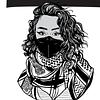Take a photo of a barcode or cover
informative
reflective
slow-paced
Graphic: Colonisation
Moderate: Death, Gun violence, Violence, Death of parent, Murder, Injury/Injury detail
Minor: Blood, Grief, Fire/Fire injury
informative
reflective
sad
medium-paced
challenging
emotional
informative
medium-paced
challenging
informative
reflective
medium-paced
This is my third book by Raja. Again, it's reading about the effects of the military occupation in different Palestine areas. Some information about his life I learned previously in other books. What made this book so interesting was seeing how he described specific friendships and how it took him years to be fully conscious of his own presence living in the occupation and that while "friends" sympathize with him on some topics they were actually, in my opinion as he didn't come out and say this, just bigots, cowards and zionists. I find Raja tends to be non biased towards the Is Not Real people as a way of staying objective and honest about the situations he's faced but because this topic is so disastrous and frustrating.
More people need to learn about Palestine and the years they've suffered and how they continue to suffer 😔
More people need to learn about Palestine and the years they've suffered and how they continue to suffer 😔
challenging
dark
emotional
hopeful
informative
inspiring
reflective
sad
tense
fast-paced
hopeful
informative
reflective
slow-paced
as someone who struggles to get into political non-fiction, i thought this was beautifully written and was entirely invested. Raja depicts a horrifying conflict through relationships and life experiences which adds so much depth and humanity to the situation.
I found this the most difficult of Shehadeh's books I've read so far. His writing is still moving and beautiful, and his descriptions of life in Palestine ever eye-opening. However, many of his conclusions in his questions on how to stay friends with Israelis were frustrating.
In one argument, he explores how even memory is politicized in Israel and Palestine. The Israeli example: "The Israeli Knesset passed the Nakba Law, depriving any state-funded body that commemorated the Nakba of its budget. In this way, Israel is attempting to erase the memory of the most traumatic event in Palestinian history." What do Palestinians - a people forced from their land, separated by illegal settlements and walls, abused at border crossings, without an equal voice in the Knesset or an equal government - have held as an equal example to this law? “The Palestinians have to accept that after the Holocaust, many countries failed to take in European Jews. For many, Palestine was their last refuge." Palestinians are not to blame for the Holocaust. No country is wrong for welcoming refugees, but it is the modern state of Israel that carried out the Nakba, and it is the very same state that denies it (while it continues it!) This forcing of Holocaust guilt onto Palestinians is perhaps even clearer today, as Germany weaponizes Holocaust remembrance to arm Israel and silence any protest, even going so far as to accuse Jewish protestors of anti-Semitism, arrest them, beat them, and otherwise cancel their events and silence them. [Please see: Iris Hefets, Adam Broomberg, Deborah Feldman, Udi Raz, Yuval Carasso, Shir Hever, the group Jüdische Stimme, Strike Germany, and so many more.]
Another example: Shehadeh’s friend has a daughter the friend describes as the "most Israeli" of his family. He talks of how she is excited to join the army. Shehadeh is at first angry that this "friend," who was purportedly at least liberal and allegedly opposed to the occupation, could raise a child to have no concept of the horrors Palestinians struggle against and the violence the Israeli state enacts on innocent Palestinians. Instead of asking his "friend" how this could be, Shehadeh blames himself. If only he had gone through the pains to visit this "friend" more often, the daughter might have known a Palestinian and had learned about Palestinian history from him! But WHY should this guilt be felt by Shehadeh? Shouldn't this "friend" have known more than just one Palestinian? If he was truly against the occupation, shouldn't he have worked harder to disabuse his daughter of Israeli propaganda?
In one argument, he explores how even memory is politicized in Israel and Palestine. The Israeli example: "The Israeli Knesset passed the Nakba Law, depriving any state-funded body that commemorated the Nakba of its budget. In this way, Israel is attempting to erase the memory of the most traumatic event in Palestinian history." What do Palestinians - a people forced from their land, separated by illegal settlements and walls, abused at border crossings, without an equal voice in the Knesset or an equal government - have held as an equal example to this law? “The Palestinians have to accept that after the Holocaust, many countries failed to take in European Jews. For many, Palestine was their last refuge." Palestinians are not to blame for the Holocaust. No country is wrong for welcoming refugees, but it is the modern state of Israel that carried out the Nakba, and it is the very same state that denies it (while it continues it!) This forcing of Holocaust guilt onto Palestinians is perhaps even clearer today, as Germany weaponizes Holocaust remembrance to arm Israel and silence any protest, even going so far as to accuse Jewish protestors of anti-Semitism, arrest them, beat them, and otherwise cancel their events and silence them. [Please see: Iris Hefets, Adam Broomberg, Deborah Feldman, Udi Raz, Yuval Carasso, Shir Hever, the group Jüdische Stimme, Strike Germany, and so many more.]
Another example: Shehadeh’s friend has a daughter the friend describes as the "most Israeli" of his family. He talks of how she is excited to join the army. Shehadeh is at first angry that this "friend," who was purportedly at least liberal and allegedly opposed to the occupation, could raise a child to have no concept of the horrors Palestinians struggle against and the violence the Israeli state enacts on innocent Palestinians. Instead of asking his "friend" how this could be, Shehadeh blames himself. If only he had gone through the pains to visit this "friend" more often, the daughter might have known a Palestinian and had learned about Palestinian history from him! But WHY should this guilt be felt by Shehadeh? Shouldn't this "friend" have known more than just one Palestinian? If he was truly against the occupation, shouldn't he have worked harder to disabuse his daughter of Israeli propaganda?
In the end, my frustrations are less with Shehadeh and more with the occupation. I would still recommend the book, as like his other works, it has given me more to think about and opened my heart to many emotions.
“It had become increasingly harder to leave the house. This was another feature of our imprisoned state. We had become too attached to life behind bars, we were afraid that if we left we would not be allowed back. I was becoming like a dear relative for whom every farewell was an ordeal. Whenever he came to visit, he had to be forced to leave. Ever since, I heard of how my father had left the office that evening before he was murdered. How he had lingered, spoken individually to everyone. Started to leave, then returned. I had begun to pay attention to farewells, as though it was necessary to memorize every detail and gesture, lest it be the last.”
[Please forgive any errors in the quotes: I read to this as an audiobook and transcribed the quotes as best I could.]
[Please forgive any errors in the quotes: I read to this as an audiobook and transcribed the quotes as best I could.]
challenging
emotional
hopeful
informative
inspiring
reflective
medium-paced
I loved this book. The humanity and self awareness of the author, a Palestinian, were a breath of fresh air. His ability to see nuance rather than in black and white is much needed in this conflict. I loved the honesty with which he recounted his struggles remaining friends with Henry, an Israeli Jew, through the various conflicts in Israel/Palestine. This is the best book I’ve read so far relating to this conflict. The author is not objective - no one who lives there can possibly be - but he refuses to dehumanize the other side. His decades-long friendship with Henry gives me hope for humanity.
I think this quote gets to the heart of the issue:
“The Palestinians have to accept that after the Holocaust many countries failed to take in European Jews. For many, Palestine was their last refuge. Israelis have to remember the Nakba, withdraw from the Occupied Territories and acknowledge the brutality they have used against Palestinians struggling for self-determination and basic human rights.”
reflective
slow-paced
Nonfiction
Memoir
Palestinian Author
Reaction to events NOT an explanation OF events
This book is a reaction to the events so if you know NOTHING about Israel and Palestine this isn’t the one to read. Read this after a more historical one.






